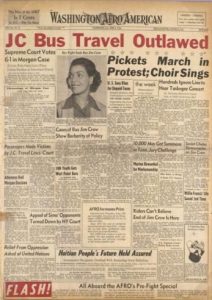
—The arrest of African American Irene Morgan for refusing to give up her bus seat to a white passenger led to a U.S. Supreme Court decision that found laws that required segregated seating on interstate transportation unconstitutional—
—The marker’s text reproduced below—
Sponsors of a state historical marker issued by the Virginia Department of Historic Resources will dedicate a sign this Saturday that highlights the arrest in 1944 of Irene Morgan, an African American, who refused to give up her bus seat to a white passenger. Her lawsuit challenging Virginia law led to a U.S. Supreme Court decision that found laws requiring segregation of passengers on interstate transportation unconstitutional. The public dedication and unveiling ceremony for the marker begins at 10 a.m., Saturday, February 1, at the sign’s location at 2425 Hayes Road in the community of Hayes in Gloucester County. Speakers at the event will include Robin Washington, producer of the 1995 PBS documentary “You Don’t Have to Ride Jim Crow”; Morgan’s granddaughter, Shoshanna Bacquie Walden; and Jim Hare, of the Department of Historic Resources. Other participants will be Morgan’s daughter, Brenda M. Bacquie, and niece, Cleo Warren; Ben Borden, a longtime resident of Hayes; Anne Dyal and Rachel Burnette, both of the Gloucester Historical Committee, and Dr. Dorothy C. Cooke, a sponsor of the marker, and the Reverend Warren Ward, a nephew of Morgan’s and pastor of First Baptist Church, Ordinary. Jadyn Forrest will perform a musical contribution. Irene Morgan boarded a Greyhound bus on July 16, 1944, at the Hayes Post Office, for a return trip to her home in Baltimore, MD, after visiting her mother. About 25 miles down the road, the bus driver ordered Morgan to give up her seat to a white passenger. Morgan refused, and under Virginia’s segregation laws, Middlesex County sheriffs arrested and jailed her in Saluda. Her resulting case, Morgan v. Virginia, reached the U.S. Supreme Court in 1946, when it made its landmark decision. The Virginia Board of Historic Resources, authorized to designate new state historical markers, approved the Morgan marker in June 2019. The marker’s sponsor, Friends of the Gloucester Museum, covered its manufacturing costs. In 1927, Virginia’s historical highway marker program erected the state’s first historical markers along U.S. Route 1. The program is considered the oldest such public roadside history initiative in the nation. Today there are more than 2,600 official state markers, most maintained by the Virginia Department of Transportation and by local partners in jurisdictions outside of VDOT’s authority. Text of marker:The Irene Morgan Story Begins
On this site stood the Hayes Store Post Office, where Irene Morgan boarded a Greyhound bus on 16 July 1944. Morgan, an African American woman, was returning home to Baltimore, MD, after visiting her mother. About 25 miles north of here, the bus driver ordered her to give up her seat so that white passengers could sit. Refusing to comply, she was arrested and jailed in Saluda, VA. Her case reached the U.S. Supreme Court, which decided in Morgan v. Virginia (1946) that laws requiring the segregation of passengers in interstate transportation were unconstitutional. Morgan took her stand 11 years before Rosa Parks in Montgomery, AL.
Programs
DHR has secured permanent legal protection for over 700 historic places - including 15,000 acres of battlefield lands
DHR has erected 2,532 highway markers in every county and city across Virginia
DHR has registered more than 3,317 individual resources and 613 historic districts
DHR has engaged over 450 students in 3 highway marker contests
DHR has stimulated more than $4.2 billion dollars in private investments related to historic tax credit incentives, revitalizing communities of all sizes throughout Virginia